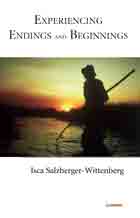Experiencing Endings and Beginnings

Book Details
- Publisher : Routledge
- Published : 2013
- Cover : Paperback
- Pages : 208
- Category :
Psychoanalysis - Catalogue No : 33546
- ISBN 13 : 9781780491714
- ISBN 10 : 1780491719
Customer Reviews
Our customers have given this title an average rating of 4 out of 5 from 1 review(s), add your own review for this title.
Anne Jeffs on 10/02/2015 12:43:07




 (4 out of 5)
(4 out of 5)
In the object relations psychoanalytic world, Isca Salzberger-Wittenberg, a Consultant Psychoanalytic Child and Adult Psychotherapist of long and deep experience, has become well known for her original approach to thinking about endings and beginnings in life. Experiencing Endings and Beginnings is testament to her long, sustained engagement with this topic, she is now in her nineties, and reveals a deep psychoanalytic understanding of universal aspects of the life course, written with a warmhearted immediacy that is engaging, wise and relevant. As she covers each phase of life, she keeps an eye on the infantile aspects of ourselves, taking as prototype the first ending- and beginning, as we leave the safety and security of the womb to enter the startling and unfamiliar non-aqueous world. An experienced infant observation seminar leader, Salzberger-Wittenberg emphasizes the quality of the first relationships, and their capacity (or not) to hold us through the transition from ending to beginning, and reflects on how this internalized experience continues to be re-evoked at every transition. Those familiar with the psychoanalytic theories of Melanie Klein, Wilfred Bion and Donald Winnicott, will recognize how deeply they have influenced her, however Salzberger-Wittenberg speaks to her audience in her own humane, non-technical, clear voice. Theory is at times referred to, but in a way that is so experience-close that it is brought to life not only for a general non-specialist readership and non-psychoanalytic clinicians, but also illuminates it freshly for experienced psychoanalytic therapists.
For the psychoanalytic therapists, it is a delight to have what we hope we do, written about with such erudition and love.

